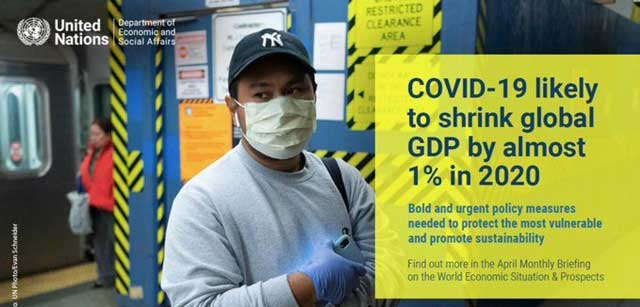
Kampala, Uganda | THE INDEPENDENT | The global economy could shrink by up to one per cent in 2020 due to the COVID-19 pandemic, and may contract even further if restrictions on economic activities are extended without adequate fiscal responses.
This is according to an analysis by the UN Department of Economic and Social Affairs (DESA). The briefing finds that millions of workers are at risk of losing their jobs as nearly 100 countries close their national borders. Today, cities are waking up to more empty streets, shuttered shops, overflowing hospitals, and orders to social distancing, which drag down the economy and threaten jobs.
Economists had previously projected that the global economy would grow by 2.5 per cent this year. However, the tide has changed as the novel coronavirus puts the world at war. Now, they are forecasting a global economic contraction of 0.9 per cent by the end of 2020, or even higher if governments fail to provide income support and help boost consumer spending. By comparison, the world economy contracted by 1.7 per cent during the global financial crisis in 2009.
According to the forecast, lockdowns are hitting the service sector hard, particularly industries that involve physical interactions such as retail trade, leisure and hospitality, recreation and transportation services. Collectively, such industries account for more than a quarter of all jobs in these economies.
As businesses lose revenue, unemployment is likely to increase sharply, transforming a supply-side shock to a wider demand-side shock for the economy, the analysis says. But it adds that the severity of the impact will largely depend on the duration of restrictions on the movement of people and economic activities and on the scale and efficacy of responses by national treasuries.
Against that backdrop, the Department of Economic and Social Affairs is joining a chorus of voices calling for well-designed fiscal stimulus packages which prioritize health spending and support households most affected by the pandemic.
“Urgent and bold policy measures are needed, not only to contain the pandemic and save lives but also to protect the most vulnerable in our societies from economic ruin and to sustain economic growth and financial stability”, said Liu Zhenmin, the Under-Secretary-General for Economic and Social Affairs.
Today’s analysis also warns that the adverse effects of prolonged economic restrictions in developed economies will soon spill over to developing countries via trade and investment channels. Developing countries, particularly those dependent on tourism and commodity exports, face heightened economic risks.
Global manufacturing production could contract significantly, and the plummeting number of travellers is likely to hurt the tourism sector in small island developing States, which employs millions of low-skilled workers.
Elliot Harris, the UN Chief Economist and Assistant Secretary-General for Economic Development said the collective goal must be a resilient recovery which puts the planet back on a sustainable track. “We must not lose sight of how it is affecting the most vulnerable population and what that means for sustainable development,” he stressed.
‘The alarms raised by UN-DESA echo another report, released on 31 March, in which UN experts issued a broad appeal for a “large-scale, coordinated, comprehensive multilateral response” amounting to at least 10 per cent of the global gross domestic product (GDP).
The document, titled “Shared responsibility, global solidarity: Responding to the socio-economic impacts of COVID-19,” describes the speed and scale of the outbreak, the severity of cases, and the societal and economic disruption of the coronavirus.
********
URN
 The Independent Uganda: You get the Truth we Pay the Price
The Independent Uganda: You get the Truth we Pay the Price


